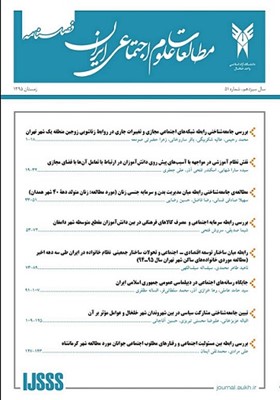مقایسه نگرش دو نسل از زنان شاغل شهر تهران نسبت به عوامل اجتماعی موثر بر باروری
محورهای موضوعی : خانواده
1 - گروه علوم اجتماعی،دانشکده علوم اجتماعی،دانشگاه آزاد اسلامی واحد تهران مرکزی، تهران، ایران.
کلید واژه: باروری, زنان شاغل, عوامل اجتماعی, نگرش,
چکیده مقاله :
پژوهش حاضر با هدف مقایسه نگرش دو نسل از زنان شاغل شهر تهران نسبت به عوامل اجتماعی موثر بر باروری انجام شده است. چارچوب نظری پژوهش حاضر بر اساس نظریات اشتاین، ایسترلین، دمونت، دیویس و کالدول میباشد. روش این پژوهش، پیمایشی و از نوع توصیفی و تبیینی است، طرح پژوهش مطالعه مقطعی است و با تکنیک پرسشنامه توام با مصاحبه و مشاهده که دارای اعتبار صوری و اعتبار سازه ای و اعتماد (آلفای کرونباخ 82/0) در جامعه آماری زنان 29-20 ساله و 49-40 ساله شاغل در شهر تهران که حجم نمونه با فرمول کوکران محاسبه و 400 نفربا روش نمونه گیری خوشه ای و تصادفی ساده به گردآوری اطلاعات اقدام شد. در نهایت در بررسی فرضیههای تحقیق نتایج ذیل حاصل شده است: نتایج به دست آمده از ضریب همبستگی نشان داد که بین منزلت اجتماعی (01/0P< ) ، عدالت محیطی(05/0P< ) و رفاه اجتماعی(01/0P< ) و باروری زنان رابطه وجود دارد.همچنین در نتایج رگرسیون مشاهده شد، منزلت اجتماعی 58 درصد، عدالت محیطی 61درصد و رفاه اجتماعی 76 درصد توانستهاند بر باروری تأثیربگذارند. با توجه بهt محاسبه شده بین نگرش دو نسل از زنان شاغل در شهر تهران نسبت به منزلت اجتماعی و عدالت محیطی با باروری تفاوت وجود دارد.
The study aimed to compare the attitudes of two generations of working women in Tehran has been done to the social factors affecting of fertility. The theoretical framework of this study based on the views of Leibenstion, Esterlin, Demont, Davis and Kaldwell.The method of this study is exploratory and descriptive survey research design is cross-sectional study and the technique of 'questionnaire and interview and observation "that has face validity and construct validity and reliability (Cronbach's alpha of 82%) was used to collect data. The study population are 20-29 year old and 40-49 year-old women working in Tehran. The sample size is calculated using Cochran formula and 400, respectively. The sampling method, a combination of cluster sampling and simple random Finally, in the research hypothesis is the following consequences: The results of the correlation coefficient revealed Between social status, Environmental justice and social welfare And there is a female fertility. The regression was observed in the results: Social status 58%, Environmental justice 61% And social welfare have 76% Affect fertility. According to T-calculated Between the attitudes of two generations of women working in Tehran The relationship between social status and Environmental justice There fertility.
_||_

